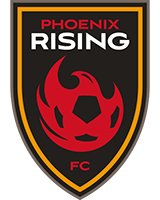- Coach Alexander, you’ve had a remarkable coaching journey from Phoenix Rising to Arizona State University. What sparked your passion for soccer, and what drove you to pursue coaching as a career?
Growing up in Falkirk, Scotland, I went to the Scottish Cup Final in 1997 as a 4 year old to watch Falkirk play. Then the next season I got a season ticket and I was hooked ever since. Once I realized my opportunities of a playing career at a high level weren’t coming to fruition, I knew that I always wanted to stay in the game. It is all I had ever known and wanted to do was be involved in soccer. I had an intrigue for coaching and for different coaches philosophies, so it seemed a no brainer to begin upon that pathway.
- Your experience spans youth soccer to the collegiate level. What were some pivotal moments or lessons learned along the way that shaped your coaching philosophy?
I was coaching my first State Cup Final, I made a couple of changes to the starting team before the game. We ended up winning the game, but the two players that went from regularly starting to not starting were very visibly upset. I thought that winning the State Cup would have been an amazing feeling but ultimately the drive home was miserable. This taught me a couple of lessons that have remained with me and helped shape my personal coaching philosophy. Firstly to focus on the process over the outcome. By centering the end result of any specific game as the be all and end all will be a very disappointing and upsetting coaching life. As coaches we do not have control over the win/loss of any specific game, the players do. We have a level of influence to help both prepare and shape the team for what they need but do not hold ultimate control. A “win” can come in many sources, not solely the result of the specific game if you focus on process over outcome. You are always on a journey to be better tomorrow than you were today.
That specific moment also taught me that the game of soccer or sport in general holds a lot of power in shaping young people and is a safe space to learn. Ultimately that day those players were upset with me. I did not communicate effectively with them and lost their trust, but looking back now, both parties hopefully learned a lot from how they behaved and responded. As a coach you are going to have tough moments but they never last and you can always take something from it. Your players are always going to have tough moments, but they also won’t last and they will be able to learn and grow from them, but only if the attitude of all parties involved is of a positive mindset to grow from the experiences gained.
- How did your time at Phoenix Rising prepare you for the transition to coaching at the collegiate level, and what were some of the biggest challenges you faced?
My time at Phoenix Rising had a massive influence in my continual development as a coach. I was able to work across multiple different platforms and in many roles, I was trusted and given opportunities to develop in areas I hadn’t ventured before. I personally believe that I was at a moment in my coaching journey where I had had enough previous experience to understand what I was trying to do, but still wet enough behind the ears to be able to soak in as many learning opportunities as possible. The club gave me opportunities in leadership roles that honestly I probably was not ready for at the the time but they trusted and supported me within these roles enough to be able to flourish in them. I also spent countless hours on the grass working on my coaching craft when I was at Rising that has given me an advantage and comfort level being able to put on sessions, and being able to adjust on the fly no matter the situation. I think some of the biggest challenges were being able to manage multiple teams and the different emotions involved with each team separately. One team may be in a really good place, and one time might not be, so trying to balance that, especially playing back to back games and having the ability to adjust your own personal emotions to what the group in front of you need right in that moment is a difficult skill to manage. This has helped me at the collegiate level, especially in the assistant role, as you have to meet the players where they are and know what they need from you, but also know what the head coach needs from you and how best to support the whole.
- What are the most significant differences you’ve observed between youth soccer and collegiate soccer, and how do you adjust your coaching approach accordingly?
Expectations, professionalism, and focus on the details.
- To bridge the gap between youth and collegiate soccer, what skills or qualities do you believe young players should focus on developing?
I think the biggest difficulty in youth soccer is consistency, and by that I mean consistency in performance, but also consistency in daily actions. Every day you are able to get slightly better helps your development compound dramatically over time. Work ethic and workrate are expectations at the collegiate level. With soccer being a fall sport there is little time to make an immediate impact, so the expectation is that you must work hard from day one. This is easier said than done, but having that type of mentality to work hard and compete every day, in every activity, training session & game, allows you to not have to learn that once you get to college. On top of that, working hard alone is not enough, as mentioned, working hard is an expectation, so even with the relentless work ethic, you are entitled to nothing, but it will help. You have to be physically ready from a fitness perspective, you have to be technically proficient and be able to make decisions at speed under pressure. Then finally, you also must be able to deal with adversity, which is a core value of the club. Most likely, most players that come to us have come from being a top player in their club team, but may not automatically be that right away. In that moment there are two reactions, poor body language, defeatism, and deflecting of responsibility, or, showing up every day ready to prove yourself in every moment. Again, neither direction guarantees that you will succeed in your goals, but one certainly has a better chance than the other
- How do you identify and develop talent in young players, and what advice would you give to aspiring collegiate soccer players?
When identifying talented young players I find it important to get as rounded a profile as possible. By that I mean, observing the player as many times as possible in as many different environments. What does their coach say about them? How are they around their teammates? How are they when the team is having a lot of success, or struggling? How are their training habits every day? How do they empower and make others around them better? Other pieces of advice I would say to young players looking to pursue collegiate soccer would be what makes you different? What makes you unique and why would that coach want you on their team? These characteristics can range from being fantastic in the air, great 1v1 in wide areas, organization and communication defensively, reading of the game as a defensive midfielder, or even as simple as having a fantastic set piece delivery. This will make coaches want to watch you again. What is your “super strength” that would enhance that specific team? I would also say that development is nonlinear. In your development you are going to have periods of great moments then periods where you find the game very difficult. If you keep striving, and don’t give up you never know what the possibilities are for your future.
- Your coaching career has been marked by significant progress and achievements. Can you share a particularly rewarding moment or success story that stands out to you?
Honestly, at this moment in my journey I personally do not place a whole lot of emphasis in specific achievements or progress. I believe that every day is an opportunity to try and be better than yesterday. Again on the non linear trend it does not always work that way but I feel it is important to keep continuing with this mindset to slowly take the next steps to grow within the profession and personally. Daily joy and gratitude for the life that I am living currently is what fuels me to try and continue along the journey. I think it’s important not to lose sight of the present, but also look to create goals for personal and professional development along the way. On a personal level one thing I have really enjoyed over the years is reconnecting with players or coaches that I have worked with in the past to see what they are doing now. Whether it’s a random meeting, or a text from an ex player sending their thanks, or asking about potential coaching opportunities and mentorship roles, they are all impactful and positive.
- How do you prioritize player development versus winning games, and how do you balance these competing demands?
With the way that the student athlete calendar works our Fall season is our competitive season. During this time honestly, it’s all about winning games. I would argue that a lot of development can happen organically during these moment’s from the adversity of a poor result/performance, to looking at different ways to try and win a game, be that tactically or with skills of the game to use the clock etc. Our defined developmental period would be during the Spring semester. We play 5 games during this time but train Mon-Fri the majority of the semester. This gives us time to focus on small group work, individual development, and team principles in a less time restricted environment.
- What role do you believe analytics and technology play in modern soccer coaching, and how have you incorporated these tools into your approach?
Technology and analytics are ever growing within the coaching profession. As a coach I believe it is our job to ensure we are up to date with as much of the modern technology as possible. While the art and science of the coach, and the ability to deal with individuals in a collective setting will always be the most important aspects of coaching, incorporating technology is becoming increasingly important. The analytics and technology will never give you guaranteed success but will in moment give % gains that cannot be overlooked. Currently during games I am positioned in the press box. We have access to a live stream of the game, where I am able to record, clip and edit pieces of the game that may be beneficial to the team’s success. I can then send them directly to the bench real time, and/or present to the team at half time in order to enhance their decision making in the second half. We can also generate scouting reports for each upcoming opponent with over 20 pages of in depth information regarding everything about the certain teams trends and individual players trends. We have also created analytical models for both talent identification and performance review relating to our personal game model, player profiles and style of play. Again, the role of the coach will always be the most important, but if you want to have success it would not make sense to overlook the % gain that using analysis and technology can bring.
- For aspiring coaches, what qualities, skills, or experiences do you think are essential for success in the collegiate coaching world?
I have found that being flexible is really important in the role of an assistant at the collegiate level. You may be asked or assigned by the head coach to fulfill a number of different roles across many different portions of the program. So, being able and eager to learn whatever those specific roles may need is important. Being proactive and solution oriented also helps keep the ship sailing the right direction. Also flexibility in terms of time is important. Especially during the season the job can become consuming, you may be asked to complete a task at 10pm at night or 5am in the morning and it is your responsibility to get it done. Whether its opposition analysis, recruiting, organizing visits, or anything in between it all takes time and effort to ensure the quality is at the level that it needs to be. As an assistant coach, flexibility in your views is also important, ultimately its the head coach’s responsibility for the team so you have to make sure that you are supportive in their opinions and understanding in order to share with the team. From a player perspective, coming to college is often the first time they have true freedom. This means that they may get home sick or may need advice on how to best navigate the college life. The role of a collegiate coach is to meet them where they are and make sure they get the support they need from a personal level no matter how far away from home they are or feel. The final piece I would say is that you have to have a love for the game, it is amazing to be able to practice at 8am in the sunshine every morning, you have to enjoy these experiences and have a drive and work ethic to continue to push yourself, and therefore help the development of the team, and the program as a collective.



















































































































































































































































































